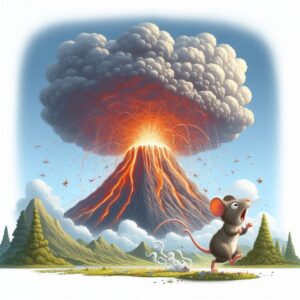大山鳴動して鼠一匹とは?
「大山鳴動して鼠一匹(たいざんめいどうしてねずみいっぴき)」は、大騒ぎをして期待を大きく膨らませた結果、実際には小さな成果やつまらない結果しか得られないことを意味することわざです。「山が大きく揺れ動き、何か大きなものが現れるかと思いきや、出てきたのはたった一匹の鼠だった」というイメージを表しています。このことわざは、実際の成果や結果が期待外れだったり、誇張が空回りしたりする状況を例えた表現です。
由来と背景
「大山鳴動して鼠一匹」という表現は、ローマの詩人ホラティウスの詩に由来しています。ホラティウスの詩の中で、巨大な山が地鳴りを立てて崩れそうになるも、そこから出てきたのは小さなネズミ一匹だった、という比喩が描かれており、これが日本にも伝わり広まりました。
この表現は、古今東西で見られる「大げさな騒ぎが小さな結果に終わる」という状況を描写しており、物事の結果が期待値と大きくかけ離れている場合の皮肉として使われます。騒動や期待感が大きいほど、それが小さな成果に終わったときの落差が大きく、そこからくる失望感や滑稽さが強調される言葉です。
現代での使用例
「大山鳴動して鼠一匹」は、大きな期待や準備が空回りして、実際には小さな結果に終わる状況に使われます。
ビジネスや政治での期待外れの発表
大々的な宣伝や会見を行ったものの、新商品の特徴が期待以下であったり、政策が不十分だったりする場合、「大山鳴動して鼠一匹」と表現されます。
映画やドラマなどのエンターテイメント
期待が非常に高まっていた映画やドラマが、実際に観てみたら内容が平凡であったり、ストーリーが陳腐だったりした場合に、「大山鳴動して鼠一匹」として失望感を表すために使われます。
個人の活動やイベント
大きな準備や宣伝をした割に、実際の内容が期待を裏切る場合にも用いられます。たとえば、大々的に準備したプロジェクトが些細な結果で終わった場合に、この表現で実情を表すことができます。
類似表現
「期待外れ」や「大風呂敷を広げる」という表現も似たような意味を持ちます。また、「張り子の虎」や「山椒は小粒でもぴりりと辛い」といった言葉も、物事の実態や期待との違いを強調する表現として使用されることがあります。
教訓
「大山鳴動して鼠一匹」は、大げさな準備や期待を抱くことが、必ずしも良い結果を生むとは限らないという教訓を含んでいます。また、現実の成果が期待にそぐわない場合も多いため、過度な期待や誇張には注意が必要であることも示しています。
「大山鳴動して鼠一匹」とは、大きな期待や騒動に対して実際の結果が小さくて期待外れであることを指すことわざです。この表現は、期待と結果がかけ離れた状況や大騒ぎした末に得られる結果の小ささを皮肉る際に用いられます。過剰な期待に惑わされず、物事の現実的な結果や実情を冷静に見ることの重要性を示しています。
Taizan meidotte datsudo nezumi ichibiki” is a proverb meaning that a great deal of fuss and high expectations actually result in only small or trivial results. It represents the image of “A big mountain shook and one rat came out, but all that came out was a single rat. This proverb is an expression likening a situation in which actual results or outcomes are disappointing or exaggerations come up empty.
Origin and Background
The expression “A big mountain shook and one rat came out” is derived from a poem by the Roman poet Horatius. In his poem, he describes how a huge mountain was about to collapse with a rumbling sound, but only a small mouse came out of the mountain.This expression describes a situation seen in both East and West, where “a great commotion ends in a small result,” and is used ironically when the outcome of a thing is far from what is expected. The greater the fuss and expectations, the greater the falloff when it ends in small results, and the word emphasizes the sense of disappointment and ridiculousness that comes from it.
Examples of modern usage
Daisen mewudo to nezumi ichimichi” is used in situations where high expectations and preparations have come up empty, and the results are actually small.Disappointing announcements in business or politics
When a major publicity or press conference is held, but the features of the new product are below expectations or the policy is inadequate, it is expressed as “Daisen meowudo shite no netsu ichimichi”.Entertainment such as movies and dramas
When a movie or drama that has been highly anticipated is actually seen and the content is mediocre or the story is stale, the expression “Daisen meigoto shite no nigiritachi” is used to express a sense of disappointment.Personal activities and events
It is also used when the actual content of an event falls short of expectations in spite of extensive preparation and publicity. For example, this expression can be used to express the reality of a project that was prepared extensively but ended up with trivial results.Similar expressions
The expressions “disappointing” and “big talk” have similar meanings. Words such as “hari-ko no tiger” and “sansho wa kobo ko kiriri spicy” can also be used to emphasize the reality of things or the difference from expectations.Lesson Learned
Daisen meow to nezumi ichiritai” (The mountain rumbles and the mouse swallows one) contains the lesson that exaggerated preparations and expectations do not always lead to good results. It also indicates that one should be careful not to over-expect or exaggerate, as the actual results often do not meet expectations.Conclusion
Daisen mewuru to nezumi ichimichi” is a proverb that refers to high expectations and uproar with small and disappointing actual results. This expression is used ironically to describe a situation in which expectations and results are far apart, or in which the results obtained after a great deal of fuss are small. It indicates the importance of not being misled by excessive expectations and of looking at the realistic results and actual situation of things dispassionately.
AIが描いた「大山鳴動して鼠一匹」






















コメント